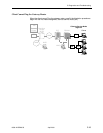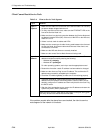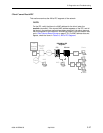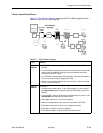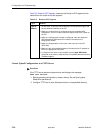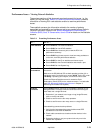
5. Diagnostics and Troubleshooting
5-16
April 2001 8000-A2-GB26-50
If the problem persists after the above items are checked, the client-to-DSL card
segment of the network is functional.
Layer 1 –
Physical
(continued)
1. Make sure the
LINE LED on the SN is lit. This verifies a DSL
connection to the AN.
2. On the AN, make sure the
LINE STATUS is up.
3. Make sure the CO splitter is connected correctly. The DSL line goes to
the 50-pin amphenol jack on the chassis and the other line goes to the
PSTN switch in the central office.
4. Make sure the 50-pin amphenol jack is firmly attached to the correct
interface on the chassis. For the 20-slot chassis, the ports are labeled
1-6, 7-12, and 13-18.
5. Make sure the loop characteristics are within MVL/RADSL/SDSL
specifications.
Layer 2 –
Network
1. On the AN, if using static IP addressing, make sure the address is
correctly configured (screen
A-E-F
).
2. On the AN, make sure all configured ports are in use (screen
B-B-A
).
If ports are not in use, properly configure them.
3. On the AN, check the status of the port (screen
A-C-B
). If the status is
not active, restart the port.
4. If dynamic addressing is being used and the clients cannot get an
IP address from the DHCP server, statically configure an IP address
and then verify that the client can Ping the DHCP server. After the
client reaches the server, remove the IP address and return the
system to dynamic (DHCP) addressing.
5. An ARP table may have invalid entries if a recent configuration change
took place anywhere on the network and enough time has not passed
for the entry to expire. Check the ARP tables on the client, AN, and
router.
6. To ensure connection between the AN and SN, perform a packet echo
test (screen
D-C
). Make sure the number of packets sent is the same
as the number of packets received. If fewer packets are being received
than sent, the SN may not be functioning correctly.
7. If the AN fails to connect to the SN, attempt to connect upstream and
downstream at lower speeds or configure the card to rate adaptive
mode (screen
A-B-B
). When a speed is changed, the port must be
restarted (screen
A-C-B
) for the change to take effect.
Table 5-5. Service Node-to-DSL Card (Access Node) Segment (2 of 2)
Layer Solution








